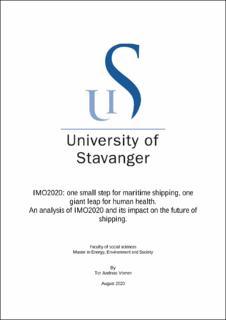| dc.description.abstract | Maritime shipping is the backbone of international trade, and represent 80-90% of global trade. However, this comes with a cost, namely pollution. The shipping industry represent about 15% of global nitrogen oxide (NOx) and 13% of global Sulphur Oxide (SOx) pollution. This air pollution have a significant impact on decreasing quality of life in areas around heavily trafficked shipping lanes, as this air pollution can cause lung diseases and other health issues. The focus of this thesis is on the International Maritime Organization’s global sulphur cap, also known as IMO2020. IMO2020 is a regulation which is cutting the sulphur level in fuel oil for ships from 3.5% to 0.5%. It is estimated that IMO2020 will cut sulphur emissions by 77%.
The goal of this study is to research how IMO2020 have affected shipping and how the industry will develop in the coming years, thus the problem statement is How will IMO2020 impact the future development of maritime shipping. This will be analyzed through the theoretical framework of the multilevel perspective, which is a theory geared towards understanding the dynamics of transitions. In order to answer this problem statement I have included 3 research questions;
1. Why is not other alternative niches considered a solution for IMO2020?
2. What is IMO2020 a result of?
3. Will IMO2020 lead to a transition or a transformation within maritime shipping?
The results from this study is that the alternative niche propulsion technologies, such as biofuels or hydrogen, was not able to exploit the opportunities of IMO2020 because of insufficient infrastructure, and research and development, leaving them too expensive for the market.
IMO2020 is a result of landscape pressure, as the knowledge on the consequences of air pollution have made people more aware, and thus their values of protecting the air and their health is increasing. This pressure of limiting air pollution is spreading to nation states, politicians, companies and industries, which again spreads into IMO discussions.
In the case of a transition or a transformation is it that IMO2020 can be seen as a step towards a transition, but IMO2020 itself did not directly lead to a transition within maritime shipping, based on usage of alternative fuels. However, IMO2020 is a successful regulation, as sulphur pollution from maritime shipping will be dramatically reduced. | en_US |
